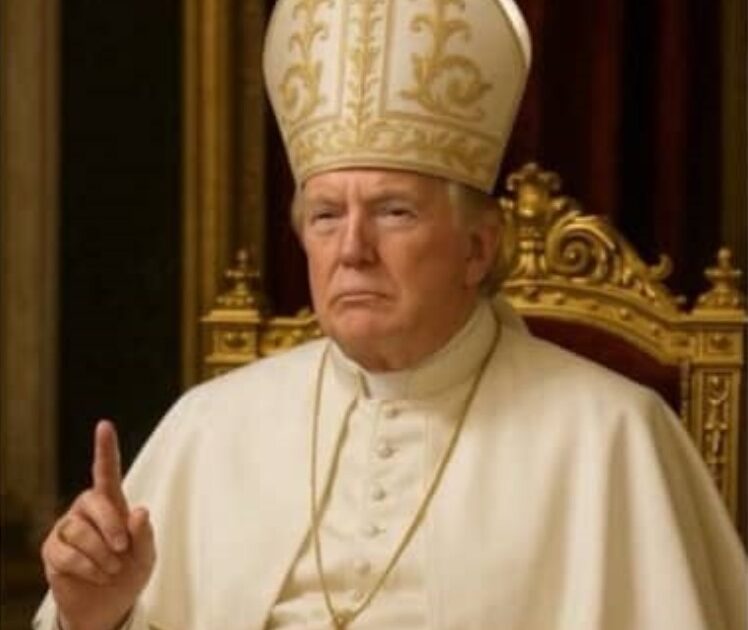Donald Trump’s recent foray into papal humor has sparked a wave of online discussion, culminating in the former president posting an AI-generated image of himself dressed as the pope on his Truth Social platform. This act followed his jestful remark to reporters, expressing a desire to become the next pontiff just days before the papal conclave to elect Pope Francis’ successor. The image, depicting Trump in full papal regalia, including white robes, a gold crucifix, and the mitre hat, further amplified the discussion around his comments. This incident provides a glimpse into Trump’s engagement with religious themes and his relationship with the Catholic Church, a prominent religious demographic in the United States.
Trump’s seemingly offhand remark regarding his papal aspirations was made in response to a question about his preference for Pope Francis’ successor. While he claimed not to have a specific preference beyond a “very good” cardinal in New York, likely referring to Archbishop Timothy Dolan, known for his conservative stance and anti-abortion views, the remark itself was noteworthy. Dolan’s alignment with certain conservative ideologies resonates with a segment of the Catholic population, and Trump’s acknowledgment of him, even in a joking context, highlights the intersection of political and religious spheres. Trump’s attendance at Pope Francis’ funeral, marking his first foreign trip since returning to power, underscores the importance of the Catholic Church within the American political landscape.
The interplay between Trump and the Catholic Church has been a complex one. While approximately 20% of Americans identify as Catholic, and exit polls suggest a significant portion voted for Trump in previous elections, his relationship with Pope Francis was often characterized by contrasting viewpoints. Pope Francis, a globally recognized moral authority, frequently criticized Trump’s policies, particularly his stance on immigration and the construction of a border wall between the US and Mexico. The Pope’s declaration that anyone prioritizing wall-building over bridge-building was “not a Christian” presented a direct challenge to Trump’s core policy proposals.
This tension between Trump and Pope Francis highlights the broader divisions within the Catholic Church itself. While a segment of Catholic voters aligns with Trump’s conservative values, particularly on social issues, Pope Francis’ emphasis on social justice, environmentalism, and inclusivity resonates with a different segment of the Catholic community. Trump’s seemingly lighthearted remark about becoming pope, therefore, takes on a more complex meaning when considered against the backdrop of his relationship with Pope Francis and the diverse political and social views within the Catholic Church. The AI-generated image further complicates the interpretation, potentially seen as satire, a genuine expression of ambition, or a provocative move to engage his base.
The timing of Trump’s comments, just days before the papal conclave, is also significant. The conclave, a secretive process by which cardinals elect the new pope, is a period of intense speculation and anticipation within the Catholic world. Trump’s interjection of his own imagined candidacy, albeit jokingly, into this sacred process can be interpreted as a disruption, a distraction, or even a deliberate attempt to draw attention to himself. The image of Trump as pope, circulating on social media, adds another layer to this disruption, potentially trivializing the solemnity of the papal election process.
In conclusion, Donald Trump’s papal joke and the subsequent AI-generated image have ignited discussions across social media and beyond. The incident highlights the complex interplay of religion and politics in the United States, particularly within the Catholic community. Trump’s relationship with the late Pope Francis, marked by contrasting views on key moral and social issues, underscores the divisions within the Catholic Church itself. The timing of his remarks, coinciding with the upcoming papal conclave, adds further complexity to the situation. While Trump’s intention may have been humorous, the ensuing reactions and the dissemination of the AI-generated image have prompted broader reflections on the intersection of faith, politics, and the role of social media in shaping public discourse.














